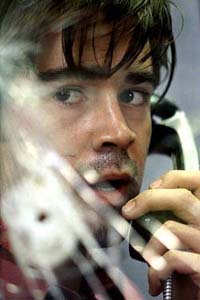
|
The "It's Alive!" horror films and Cohen's other '70s/early-'80s exploitation classics are favorites of Freudian-Marxist film critics. Phone Booth deserved a director able to convey the psychological unrest Cohen locates in capitalist greed, social institutions, and media-age cynicism. Still, despite Schumacher's flashy-trash style, the Cohen-Schumacher dialectic (to get Marxist) brings out the subconscious (to get Freudian) truths in the material. The hidden pain of Cohen's abandonment by and Schumacher's capitulation to a corrupt popular culture stings like a bullet to the ear. According to a friend and aspiring filmmaker, Phone Booth poses the question: "What ooozes out of a man who's put on the spot in a good movie? Character." Cohen's script tightens the formal screws - limiting space and time almost exclusively to a little over an hour in a phone booth. "Character" "ooozes" out of Schumacher, the filmmaker, and out of Stu Shepard (as in "shepherd"), a publicist played by Colin Farrell. Stu commits the turn-of-the-millennium "sin of spin: avoidance and deception." Even here, so does Schumacher. The tinted flashbacks re-enacting the sniper's assassination of two earlier victims superficially establishes their crimes - insider trading and pedophilia - as unfit for dramatic empathy and forgiveness. Schumacher lacks subtlety and an interest in experimentation. A more inventive soundtrack would have made unnecessary the use of picture-in-picture to show the people Stu talks to on his cell phone - the voice of the unseen sniper (Kiefer Sutherland) booms like the voice of God in a 50s biblical epic. The p.i.p. only works when Stu talks to his client, a white rapper named, nodding to Cohen, "Q" - an about-time dig at Eminem, it's a flash of Schumacher's integrity. Under the gun, Stu loses his cell-phone swagger, just as he sheds his wedding ring while making a phone-booth call to his not-yet-mistress (Katie Holmes). Forced to confess all the ugly phoniness of his life, Farrell's Stu, with the actor's Irish accent fading in and out, gets. . . hotter. Finally, Schumacher's gay sensibility is neither campy (the last two "Batman" films) nor lecherous (The Client, The Lost Boys) nor pathetic (ogling Matthew McConaughey's ass in A Time to Kill). Farrell looks like a Diesel jeans model, but his beauty can't be commoditized. (A poster advertisement with a graphic of a man plummeting through an abyss serves as a Freudian-slip critique of Schumacher's commercial-break technique.) Pinned down - constrained spatially - Farrell's gestures, glances, and inflections express sexy sensitivity.
Splicing shots of black Whitaker and white Ferrell, Schumacher lays out his own psyche. It's his version of Stu's final confession - and it accounts for the power, the anguish, of Ferrell's monologue: "I've been falling ever since." Schumacher has been falling ever since he abandoned his gay-white understanding of Black culture (as in his scripts for the vulgar - in a good way - comedy Car Wash, the melodrama Sparkle, and the musical The Wiz). Phone Booth opens with a shot ascending through clouds and out of the atmosphere, scored to the oldie Operator. Schumacher returns to Earth - via the cellular wavelengths - with a montage of NYC life, including a street-corner quartet doing a hiphop version of Operator and dancers breakin' in slow-motion. Stu and the rest of the city on their cell phones ignore the expressed desire for something. . . more ("Operator, give me Heaven"). For Schumacher, Cohen's script must have been like a wake-up call. Stu's redemption blesses Schumacher with a second chance. |
|
 Colin Farrell is hunted in the Phone Booth
Colin Farrell is hunted in the Phone Booth Phone Booth director Joel Schumacher
Phone Booth director Joel Schumacher